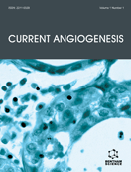Abstract
Data concerning angiogenesis in chronic lymphocytic leukaemia (CLL) indicate that CLL patients are characterized by various abnormalities in the angiogenic profile including increased microvessel density in lymph nodes and in bone marrow and increased levels of certain pro-angiogenic vascular growth factors. Vascular endothelial growth factor (VEGF) and its receptors, basic fibrobast growth factor (bFGF) and matrix metalloproteinases(MMPs) were found to be highly expressed in CLL patients while there was no difference in angiogenin expression between CLL patients and healthy individuals. VEGF is implicated in CLL pathogenesis through various mechanisms. Enhanced angiogenesis in CLL has been associated in several reports with disease characteristics and patients’ survival. Various anti-angiogenic agents targeting angiogenesis related pathways such as immunomodulatory drugs and receptor tyrosine kinase inhibitors have already been entered in clinical trials. Among them lenalidomide is the most promising antiangiogenic drug showing a significant efficacy in relapsed/refractory CLL patients.
Keywords: Angiogenesis, antiangiogenic drugs, chronic lymphocytic leukemia, vascular growth factors.
 21
21

